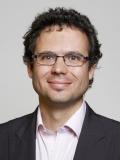Pablo lamata

Pablo Lamata was born in Soria, Spain. He received his MSc degree from the Universidad de Zaragoza (Spain), and his PhD in Biomedical Engineering from the Unviersidad Politécnica de Madrid (Spain), in 2002 and 2006 respectively. He then spent two years in industry, as a Marie Curie Fellow at Siemens in Oxford, where he developed the Resection Map for the assistance of hepatic surgical procedures. In 2009 he started working in the area of Computational Cardiology at the University of Oxford, where he has been focused since then. In 2012 he moved to King’s College of London, and he obtained his Sir Henry Dale Fellowship from the Royal Society and the Wellcome Trust in 2013, and his Wellcome Senior Research Fellowship in 2018.
Dr. Lamata is currently a Reader in Computational Cardiology at King’s College of London. His research interest focuses in the combination of imaging and computational modelling technologies to improve the management of cardiovascular diseases. He develops solutions to stratify subjects according to the remodelling of cardiac anatomy, to characterise the performance of the heart during diastole, and to assess non-invasively the pressure driving blood flow. His team (http://cmib.website) has developed solutions for the identification of faulty valves, for the detection of growth differences caused by pre-term birth, or for the optimal patient selection for ablation or resynchronization therapies, among others. He coordinates the EU consortium "Personalised In-Silico Cardiology” (http://picnet.eu) that develops modelling methodologies to optimize clinical protocols, from data acquisition to device parameters and intervention choices.
Financial relationships
**Disclaimer**
This Continuing Medical Education (CME) Learning Management System, Ethos, includes individuals designated as 'faculty' for CME purposes. Please note that the term 'faculty' refers solely to their role as a contributor/planner within a CME activity and does not imply any formal affiliation with UT Southwestern Medical Center (UTSW). The display of names and credentials is intended for educational purposes only and does not necessarily indicate a professional or academic relationship with UTSW. Participants are encouraged to verify the affiliations and credentials of faculty members independently if further clarification is needed.

 Facebook
Facebook X
X LinkedIn
LinkedIn Forward
Forward